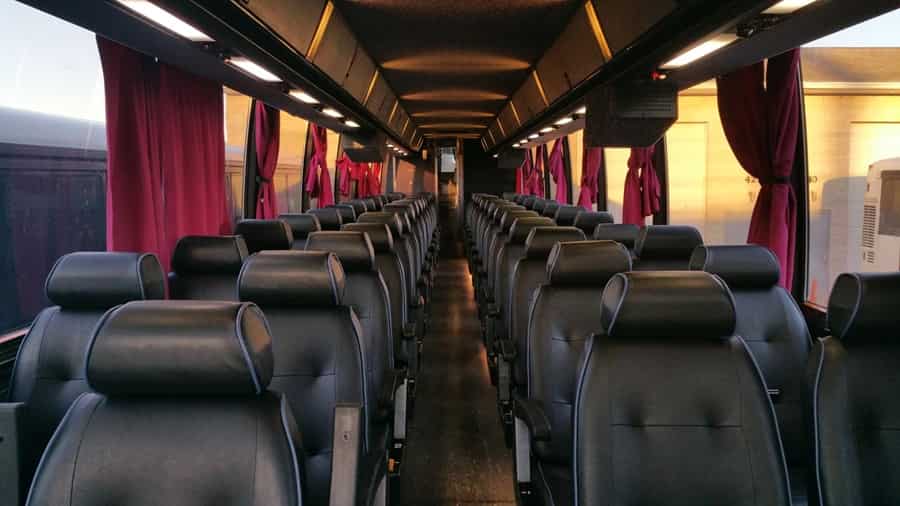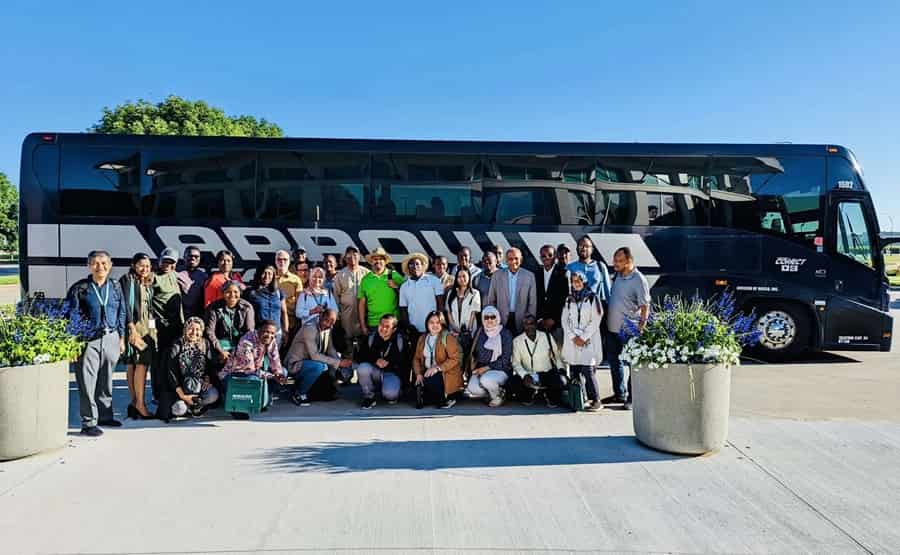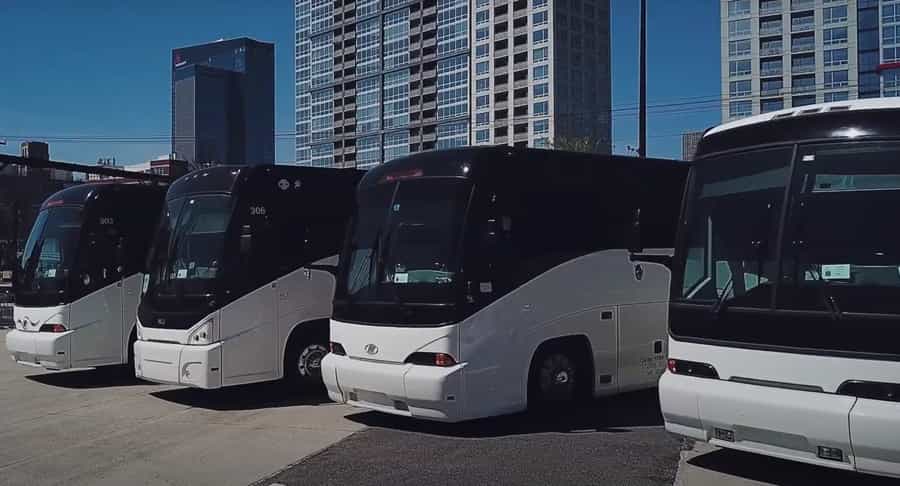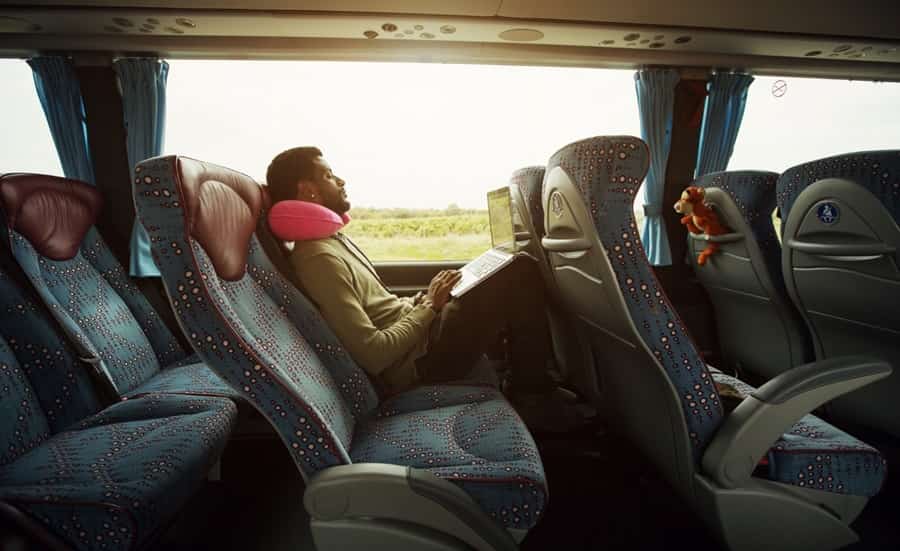Organizing a group trip involves numerous logistical challenges, with transportation being one of the most critical aspects. While options like carpooling or flying might seem viable, they often lead to complications such as delays, lost luggage, and fragmented travel experiences. Charter bus rentals provide a cohesive, safe, and efficient travel solution, particularly in sprawling cities like Atlanta or Los Angeles. This comprehensive guide will walk you through everything you need to know about charter bus rentals, ensuring your group travels seamlessly.
Understanding Charter Buses
What is a Charter Bus?
A charter bus, or motorcoach, is a vehicle reserved exclusively for the use of a group, organization, or business. Unlike public buses that operate on fixed routes and schedules, a charter bus follows a route and timetable specified by the renting party. This flexibility makes charter buses ideal for events where timely and direct transportation is essential.

Characteristics of a Charter Bus
Exterior Features:
- Panoramic Windows: These large windows provide ample natural light and scenic views.
- Storage Bays: Located under the bus, these compartments offer substantial space for luggage and equipment.
- Company Branding: Often, the bus company’s logo and branding are displayed on the bus’s exterior.
Interior Features:
- Driver’s Seat: Positioned at the front, equipped with controls and safety features.
- Passenger Seats: Rows of cushioned seats, often with reclining capability for comfort.
- Overhead Bins: Secure storage for personal items, similar to those found on airplanes.
- Restroom: Full-sized buses usually feature a compact restroom at the rear.
- Additional Amenities: Many buses include modern amenities like WiFi, power outlets, and entertainment systems.
Who Rents Charter Buses?
Charter buses are popular among a variety of groups due to their convenience and efficiency. Here are some common users:

Sports Teams
Athletic teams often rent charter buses to transport players, coaches, and equipment to games and tournaments.
Corporate Groups
Businesses utilize charter buses for conferences, team-building events, and corporate retreats, allowing employees to travel together and stay connected en route.
Schools
Educational institutions rent charter buses for field trips, sporting events, and other extracurricular activities.
Social Organizations
Groups such as fraternities, sororities, church congregations, and other social clubs use charter buses for outings, conventions, and special events.
Event Planners
Event organizers frequently rent charter buses to shuttle guests between venues, particularly for weddings, music festivals, and large-scale conferences.
Types of Charter Buses
Charter buses come in various sizes and configurations to meet different needs. Here’s a breakdown of the most common types:

Full-Sized Charter Bus
- Capacity: Typically seats around 56 passengers but can range from 36 to 60 seats.
- Ideal For: Large groups such as sports teams, corporate events, and school trips.
- Amenities: Often include restrooms, WiFi, power outlets, and entertainment systems.
Minibus
- Capacity: Seats fewer than 35 passengers.
- Ideal For: Smaller groups, weddings, local tours, and shuttle services.
- Amenities: Usually includes air conditioning and cushioned seats, with some models offering additional features like WiFi.
Party Bus
- Capacity: Similar to a minibus, accommodating 35 passengers or fewer.
- Ideal For: Social events where interaction and entertainment are priorities.
- Amenities: Designed for socializing, with perimeter seating, open floor space, lighting, and sound systems.
Entertainer Bus
- Capacity: Generally holds 8 to 12 passengers.
- Ideal For: Touring musicians, celebrities, and high-profile clients.
- Amenities: High-end features including master suites, sleeping bunks, kitchens, lounges, bathrooms, satellite TVs, and WiFi.
Key Amenities and Features
Charter buses offer a range of amenities to enhance passenger comfort and convenience. Here’s what you can typically expect:

Standard Amenities
- Cushioned Seats: Comfortable seating for long journeys.
- Air Conditioning: Essential for maintaining a comfortable temperature.
- Restrooms: Available on full-sized buses, featuring a toilet and handwashing station.
- Entertainment Systems: TV monitors and DVD players to keep passengers entertained.
Additional Amenities
- WiFi and Power Outlets: Allow passengers to stay connected and charge their devices during the trip.
- Overhead Bins: Secure storage for carry-on items.
- Luggage Bays: Ample space under the bus for larger items and equipment.
Food, Drinks, and Pets
Bringing Food and Drinks
- Allowed Items: Most charter bus companies permit passengers to bring food and drinks on board. However, it’s best to confirm with your provider.
- Considerations: Avoid messy or strong-smelling foods to ensure a pleasant environment for all passengers. Clean up any spills or trash to avoid additional cleaning fees.
Alcohol Consumption
- Policies: Many companies allow alcohol on board for adult passengers, often requiring a refundable deposit to cover potential damages.
- Safety: Encourage responsible drinking to avoid any disruptions or safety issues during the trip.
Pet Policies
- General Rule: Pets are usually not allowed on charter buses, except for service animals, which are protected under the Americans with Disabilities Act (ADA).
Prohibited Items
Certain items are not allowed on charter buses for safety reasons. These typically include:
- Weapons
- Explosives
- Flammable materials
- Dangerous chemicals
Smoking is also prohibited on charter buses, though drivers may allow smoke breaks at rest stops.
Sleeping Arrangements
Standard charter buses do not have beds, but they do offer cushioned, reclining seats for added comfort. Passengers can bring neck pillows or use window seats to rest more comfortably. For those needing actual sleeping arrangements, entertainer buses provide bunk beds and master suites.
Storage Solutions
Charter buses provide significant storage space, both inside and outside the bus:
Interior Storage
- Overhead Bins: Similar to airplane storage compartments, ideal for small personal items.
Exterior Storage
- Luggage Bays: Large compartments under the bus, perfect for storing luggage and equipment.
Minibuses have less storage space, so consider this when planning your trip and packing.
Restroom Facilities
Charter bus restrooms are compact, featuring a toilet and hand-washing station. Due to limited space, it’s advisable to use rest stops for more comfort. Encourage your group to use the bus restroom sparingly and plan for regular stops along the way.
Safety and Accessibility
Seat Belts
Since November 2016, all new motorcoaches must be equipped with seat belts. Older buses might not have them, but all buses must adhere to federal safety regulations.
Wheelchair Accessibility
Under the ADA, charter bus companies must provide wheelchair-accessible coaches upon request. Make sure to specify this need when booking to ensure an appropriate bus is available.
Professional Drivers
Charter bus companies provide professional drivers, ensuring safe and reliable transportation. Drivers can legally operate the bus for up to 10 consecutive hours before requiring an 8-hour break. For longer trips, a second driver may be necessary, adding to the overall cost.
Driver Accommodation
For overnight trips, plan to cover the cost of the driver’s hotel room. A 3-star hotel or higher is recommended to ensure the driver is well-rested and alert.
Driver Stops
While drivers will follow the itinerary provided, they are often willing to accommodate reasonable requests for additional stops at rest areas or gas stations. Confirm any potential stops with your bus company beforehand to avoid extra fees.
Booking a Charter Bus
Key Information Needed
- Destinations: Names and addresses of all pickup and drop-off locations.
- Dates and Times: Exact start and end dates of your trip, including specific pickup and drop-off times.
- Passenger Count: Total number of passengers, including any additional pickups along the way.
- Special Requirements: Any need for wheelchair accessibility or specific amenities.
Advance Booking
For the best rates and availability, book your charter bus 1-3 months in advance. For peak seasons like April, May, and June, consider booking 6-9 months ahead. Last-minute bookings are possible, but availability and options may be limited.
Cost Factors
Charter bus rental costs depend on mileage and duration. Long-distance trips are often priced per mile, while multi-day trips are charged daily. To get an accurate quote, call your provider with the details of your trip.
Tipping
Tipping is not mandatory but is appreciated. The industry standard ranges from 10-20% of the rental cost. Clarify tipping policies with your reservation specialist when booking.
Choosing the Right Charter Bus Company
When selecting a charter bus company, consider these factors:
Location
Choose a company close to your pickup location to minimize additional travel costs. This extra mileage, known as “deadhead,” can add to your expenses.
Reputation
Read online reviews and testimonials to gauge the company’s reliability and customer service. Ensure they have a strong safety record and positive feedback from past clients.
Availability
Check the company’s availability for your desired dates and ensure they can meet your specific needs, such as wheelchair accessibility or particular amenities.
Conclusion
Charter bus rentals offer a reliable, efficient, and comfortable travel solution for groups of all sizes. By understanding the different types of buses, available amenities, and essential booking details, you can make an informed decision and ensure a smooth journey for your group. For further assistance, you can reach out to our team 24/7 at +91-7703810178. Happy travels!
Suggested to Read:
